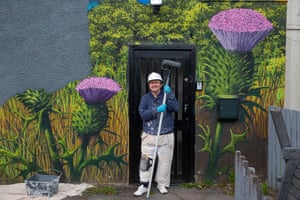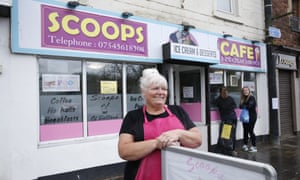Politicians and police have urged the public to stay away from Loch Lomond after it emerged thousands of people had breached the lockdown around the beauty spot in recent weeks.
Police data shows the district which includes the villages of Balloch and Luss on the banks of the loch had the highest number of lockdown breaches of any in Scotland, with police ordering 2,291 people to go home in just 30 days.
Shopkeepers in Balloch, the centre of the loch’s tourism industry, said there was a rush of visitors at weekends and on sunny days. “It’s been really mad,” said John Gray at Lomond Stores, close to the village’s railway station.
“Even on a normal summer’s day it’s not as busy as it has been these last few weeks. It’s partly the weather, and also people getting sick of lockdown. People are out with their pals as if there’s nothing going on.”
House painter Robin Rankin said: “We saw the riot squad in the park and the police were turning people back at the station.”

West Dunbartonshire, the police subdivision which also includes the towns of Clydebank and Dumbarton, accounted for 11% of the 21,487 lockdown breaches since Police Scotland began recording data by subdivision on 6 April, and the highest number of GBP60 fines issued (167).
The data shows breaches at weekends and on sunny days have increased. On Wednesday 6 May officers dispersed nearly 190 people – the highest number on any day in any subdivision since the lockdown began on 23 March.
Similar problems have emerged in Stirling, the largely rural and mountainous subdivision that covers the eastern and northern shores of Loch Lomond, as well as the Trossachs, a popular climbing and walking area.
In the 30 days from 6 April to 6 May, 1,164 dispersal orders and 71 fines were issued there, making it the fourth busiest area in Scotland. Glasgow South East has the second highest figures (1,938), with two other subdivisions in Glasgow also in the top five.
In the weeks before Police Scotland recorded lockdown breaches by subdivision, the Argyll and West Dunbartonshire division regularly recorded the highest number of daily breaches, even though it is heavily rural.
Bruce Crawford, the Scottish National party MSP for Stirling, and Jackie Baillie, the Labour MSP for the neighbouring Holyrood seat of Dumbarton, said the police had been trying hard to dissuade people from converging on local beauty spots.
Baillie said local officers in Balloch were often overstretched, and both MSPs said residents had complained about the influxes into their villages. “I think the police need to reinforce the message from the Scottish government that people shouldn’t be travelling to Loch Lomond to take their exercise; they should stay away,” Baillie said.
“I hope our stunning locations can be open for business soon, but getting there will mean stronger compliance with social distancing for a bit longer so that it will be safe to do so,” Crawford said.
Janet Moore, who sells takeaway hot drinks and food from Scoops cafe in Balloch, has covered up the signs advertising ice creams after attracting long queues of customers. She has had abuse from locals and silent phone calls. “But if I was doing anything wrong, I’d have been closed down by now,” said Moore.

“I can’t tell people what to do, but we’re trying to do everything we can. A lot of people are still working and they need hot food. We give free drinks to key workers and take cakes up to the hospital.”
Police Scotland said the force had consistently tried to dissuade people from heading to beauty spots, including beaches in Ayrshire such as Ayr and Troon, issuing appeals through the press and on the force’s social media accounts.
Ch Supt John Paterson, the West Dunbartonshire commander, said his officers had also been on patrol 24 hours a day trying to dissuade people from visiting the area. “In these messages, I have made it clear that while we are fortunate to have some areas of outstanding beauty across the division, this is not the time to visit these places,” he said.
The force is also helping an independent panel chaired by John Scott QC, a human rights lawyer, to study its lockdown enforcement in Glasgow. The three Glasgow subdivisions in the top five – South East, North West and North – accounted for 4,590 dispersal orders in those 30 days – 21% of Scotland’s total – and 120 fines.